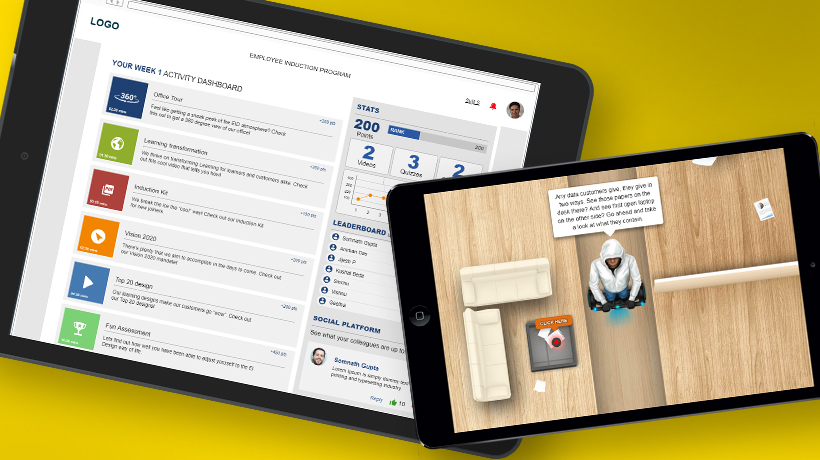
Smartphones have changed the way we learn, and the learning strategies that leverage it for training have become popular. In this article, I outline how you can combine gamification and microlearning to influence employee performance.
Gamification And Microlearning Is A Dynamite Combination
We, at EI, have been offering learning and performance support solutions for over 16 years. Over these years,
- We have seen the transformation of traditional eLearning to mobile learning.
- The wider use of mobile learning has helped adoption of techniques like microlearning based training for both formal and informal training.
- Around the same time, the usage of gamification for corporate training has been on an upswing. It is being successfully used to create engaging and high-impact training for most of the corporate training needs.
Now, the combination of these two high-impact learning strategies (gamification and microlearning for corporate training) is being used to influence employee performance and create a positive ROI. In this article, I outline the value of each of these techniques and the enhanced power of the combination.
How Are We Learning Today?
Till a few years ago, when online training was predominantly available on desktops or laptops, the bulk of the learning would happen at the workplace (that is, during work hours).
With the wider adoption of mobile learning and increase in the Bring Your Own Device (BYOD) policy providing the flexibility to learners to use their smartphones for learning, there have been 2 significant changes:
- Increase in learning on the go (for instance, during commute).
- Increase in learning in the evenings (post work hours) and over weekends.
With the momentum of “learning on the go,” there is a clear need to offer learning in shorter bites. This is where microlearning based training fits in.
There are 2 other interesting aspects in the way we learn today:
- Pulling training assets or job aids at the moment of need.
- Picking up learning when notified.
Microlearning based training facilitates both of these aspects as well.
What Is Microlearning Based Training, And What Value Does It Offer?
In contrast to macrolearning or traditional eLearning, microlearning based training offers learning through focused, short bites. However, it is not eLearning-lite. Instead, each learning bite is designed to meet a specific learning outcome.
Value of Microlearning based training: It successfully addresses the concerns of dwindling attention spans. It can also be used to successfully offset the forgetting curve.
More specifically, its value lies in its flexibility to offer:
Formal learning: Here, a series of microlearning nuggets are offered as part of a learning path (or learning journey).
Performance Support Intervention: Here, the microlearning nuggets are designed to offer support to the learners at the moment of their need. These learning aids or job aids are available to the learners within their workflow (on their smartphones), facilitating easy retrieval and application. These nuggets can address learner’s wide-ranging needs to:
- Learn more.
- Learn something new.
- Solve a problem.
- Address a specific challenge.
- Apply and remember.
- Practice in order to gain mastery.
What Is Gamification And What Value Does It Offer For Corporate Training?
Gamification uses the principles of gaming and associated elements to create an engaging and a sticky learning experience. Its power lies in its flexibility to be applied to most of the corporate training needs.
- Typically, gamification based online courses will have a story/narrative that establishes the learning journey. This journey will have associated challenges, rewards, feedback, and a controlled environment to learn and practice.
- They will have analytics to show the individual’s progress or how they are faring against the competition.
At EI, we began our gamification practice in 2012, and we have seen its acceptance soar in the last six years.
Our focus has been on using gamification for serious learning, that is, aligning it to clear learning goals that L&D teams want to see as the final accomplishment.
The key elements of game mechanics that are part of our gamification practice include:
- Challenges (learning goals)
- Levels (learning path)
- Instant feedback (to aid progress)
- Scores (accomplishment and gratification)
- Badges (for significant achievements)
- Leaderboards (for analytics)
- Competition (to assess where you stand against others)
- Collaboration (when multiple teams play)
Value of Gamification based training: If you polled employees on what aspects motivate them, the two aspects you are most likely hear would be rewards and recognition.
It stands to reason that what motivates employees should also be a part of the learning strategy. This is exactly where the usage of gamification for learning would fit in. It provides value through:
- Higher engagement (fun while learning) leading to better recall and retention.
- Instant feedback to checkpoint and help improve performance.
- A safe environment to practice and obtain the required mastery.
- Facilitating behavioral change through repeated retrieval and spaced repetition.
Today, the usage of gamification in corporate training is an important part of learning strategies for organizations as it has successfully demonstrated its ability to influence employee behavior.
How Can You Combine The Power Of Gamification And Microlearning To Generate High-Impact Training That Will Deliver The Required Results?
As I have highlighted, the usage of microlearning can be done for both formal training and Performance Support Intervention. You can use gamification to further enhance both of these as shown here:
- You can leverage on gamified learning paths that can support the learning journey that features multiple nuggets. These can have levels, challenges, awards, leaderboards and so on.
- You can have gamified assessments as part of the Formal training.
- You could also offer gamified assessments as Performance Support Tools that are stand-alone nuggets that can be pushed as challenges after the training is completed.
- This is not all—you can offer gamified nuggets in various Microlearning formats that enable learners to:
a. Practice and improve proficiency
b. Apply learning
c. Solve a problem
d. Learn something new
I hope this article helps you see the value gamification and microlearning based approaches can bring to address your corporate training needs. More specifically, it should provide you with insights on how you can leverage on the combination of gamification and microlearning to amplify your gains.
If you have any queries or need any specific support, do contact me at apandey@eidesign.net.
Read More:
- Free eBook: Why You Should Adopt Gamification For Corporate Training
- Free eBook: How Can You Create Macro Impact With Micro Nuggets
- Why You Should Adopt The Combination Of Microlearning And Mobile Learning In 2018
- Case Study – Creating Highly Engaging Corporate Compliance Training With Gamification
- 5 Killer Microlearning Examples for Employee Training
- 5 Examples Of Gamification Strategies For Corporate Training
- 5 Killer Examples On How Gamification In The Workplace Is Reshaping Corporate Training



